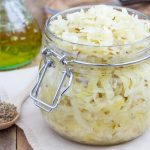Eating raw sauerkraut offers more health benefits than you think
 (NaturalHealth365) Sauerkraut, that familiar hot dog condiment, may not have the beauty of garnet-colored raspberries or the sweet, refreshing flavor of tropical fruits. But the latest scientific research tells us that freshly-made organic sauerkraut is a true superfood that boosts the immune system, promotes intestinal health, and helps prevent cancer in many ways.
(NaturalHealth365) Sauerkraut, that familiar hot dog condiment, may not have the beauty of garnet-colored raspberries or the sweet, refreshing flavor of tropical fruits. But the latest scientific research tells us that freshly-made organic sauerkraut is a true superfood that boosts the immune system, promotes intestinal health, and helps prevent cancer in many ways.
A recently published study in Critical Reviews in Food Science and Nutrition found that fermented foods such as raw sauerkraut contain chemical compounds and beneficial bacteria that offer a wide array of health benefits due to their anticancer, anti-microbial, and antioxidant activities.
How does sauerkraut prevent cancer?
Cabbage, the cruciferous vegetable from which sauerkraut is made, is already valued by natural food experts and nutritionists for its sky-high amounts of anticarcinogenic bioactive compounds. In fact, the glucosinolates in cabbage help activate the body’s own antioxidants, which fight the lipid oxidation and inflammation that can trigger cancer and heart disease.
Additionally, the process of lacto-fermentation involved in turning cabbage to sauerkraut produces beneficial bacteria. It unleashes even more potent anti-inflammatory cancer-fighting substances – taking the health benefits to a whole new level and helping to ward off cancers of the prostate, bladder, and breast.
Here is why raw sauerkraut helps ward off cancer
According to the author and natural health expert Sandor Ellix Katz, the process of lactic fermentation not only preserves the nutrients in food but breaks them down. Hence, they are even more healthful and easily digested. But what, exactly, is lactic fermentation, and why is it beneficial?
Although the term sounds somewhat technical, it is actually the natural result of layering shredded cabbage in water with salt, then letting existing bacteria on the cabbage do the work. The end product – sauerkraut – contains more live probiotic cultures than yogurt.
One result of lacto-fermentation is to create large amounts of beneficial lactobacillus bacteria, which support friendly flora in the intestinal tract. Another is the release of isothiocyanate compounds from existing glucosinolate; these isothiocyanates have shown such pronounced anticarcinogenic effects in cellular, laboratory, and human studies.
Impressive science behind the benefits of sauerkraut
In an October 2002 article in the Journal of Agricultural and Food Chemistry, researchers announced that they had isolated isothiocyanates in sauerkraut and that these compounds had cancer-protective effects in animal studies. They added that clinical research would be required to determine if these effects extended to humans.
In the twelve years since the article was published, many studies on sauerkraut and sauerkraut juice show that it lowers cancer risk in humans – particularly for cancers of the breast and colon.
In a study published in 2011 in the British Journal of Nutrition, researchers noted that the detoxifying enzymes in sauerkraut juice have an anticarcinogenic effect on kidney and liver cancer cells and added that sauerkraut juice increased levels of glutathione-S-transferase – considered a chemoprotective agent.
Sauerkraut’s probiotic cultures fight cancer in multiple ways
In a review published in 2006 in the Journal of Applied Microbiology, researchers stated that lactic acid bacteria could prevent certain types of cancer – including colon and bladder cancer – and categorized how probiotic cultures help torpedo cancer cell development.
Not only do probiotic cultures detoxify ingested carcinogens and stimulate the immune system, but they also create an environment hostile to carcinogenic compounds. Specifically, they create organic compounds – including butyrate – that inhibit tumor growth and encourage the apoptosis, or programmed cell death, of cancer cells.
The authors theorized that probiotic cultures might also suppress bacteria responsible for turning procarcinogens into carcinogens and added that lactobacillus could bind to mutagenic compounds in the intestine.
What is the best type of sauerkraut to prevent cancer?
Buy only sauerkraut that is freshly made, raw, unpasteurized, and organic; your best bet is to look for it in the refrigerated aisle of local markets or farmers’ markets. Avoid canned sauerkraut, which offers far fewer nutrients and probiotic benefits.
Most experts recommend consuming at least 1 and ½ cups of sauerkraut 4 to 5 times a week; 2-cup servings, of course, are even healthier. One cautionary note: raw sauerkraut produces raffinose, a trisaccharide that can’t be broken down in the intestine. Bloating and flatulence can result but should subside as your body becomes accustomed to this healthful food.
Simply put, fresh lacto-fermented sauerkraut, packed with cancer-fighting compounds and antioxidants and high in healthful dietary fiber, is a superb nutritional choice.
Sources for this article include:



